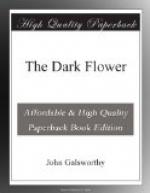“No, I like early morning—especially in spring, when it’s beginning to get leafy.”
“Well, of course.”
She was leaning against him, for safety, just a little; and stretching out his arm, he took good hold of the branch to make a back for her. There was a silence. Then he said:
“If you could only have one tree, which would you have?”
“Not oaks. Limes—no—birches. Which would you?”
He pondered. There were so many trees that were perfect. Birches and limes, of course; but beeches and cypresses, and yews, and cedars, and holm-oaks—almost, and plane-trees; then he said suddenly:
“Pines; I mean the big ones with reddish stems and branches pretty high up.”
“Why?”
Again he pondered. It was very important to explain exactly why; his feelings about everything were concerned in this. And while he mused she gazed at him, as if surprised to see anyone think so deeply. At last he said:
“Because they’re independent and dignified and never quite cold, and their branches seem to brood, but chiefly because the ones I mean are generally out of the common where you find them. You know—just one or two, strong and dark, standing out against the sky.”
“They’re too dark.”
It occurred to him suddenly that he had forgotten larches. They, of course, could be heavenly, when you lay under them and looked up at the sky, as he had that afternoon out there. Then he heard her say:
“If I could only have one flower, I should have lilies of the valley, the small ones that grow wild and smell so jolly.”
He had a swift vision of another flower, dark—very different, and was silent.
“What would you have, Mark?” Her voice sounded a little hurt. “You are thinking of one, aren’t you?”
He said honestly:
“Yes, I am.”
“Which?”
“It’s dark, too; you wouldn’t care for it a bit.”
“How d’you know?”
“A clove carnation.”
“But I do like it—only—not very much.”
He nodded solemnly.
“I knew you wouldn’t.”
Then a silence fell between them. She had ceased to lean against him, and he missed the cosy friendliness of it. Now that their voices and the cawings of the rooks had ceased, there was nothing heard but the dry rustle of the leaves, and the plaintive cry of a buzzard hawk hunting over the little tor across the river. There were nearly always two up there, quartering the sky. To the boy it was lovely, that silence—like Nature talking to you—Nature always talked in silences. The beasts, the birds, the insects, only really showed themselves when you were still; you had to be awfully quiet, too, for flowers and plants, otherwise you couldn’t see the real jolly separate life there was in them. Even the boulders down there, that old Godden thought had been washed up by the Flood, never showed you what queer shapes they had, and let you feel close to them, unless you were thinking of nothing else. Sylvia, after all, was better in that way than he had expected. She could keep quiet (he had thought girls hopeless); she was gentle, and it was rather jolly to watch her. Through the leaves there came the faint far tinkle of the tea-bell.




